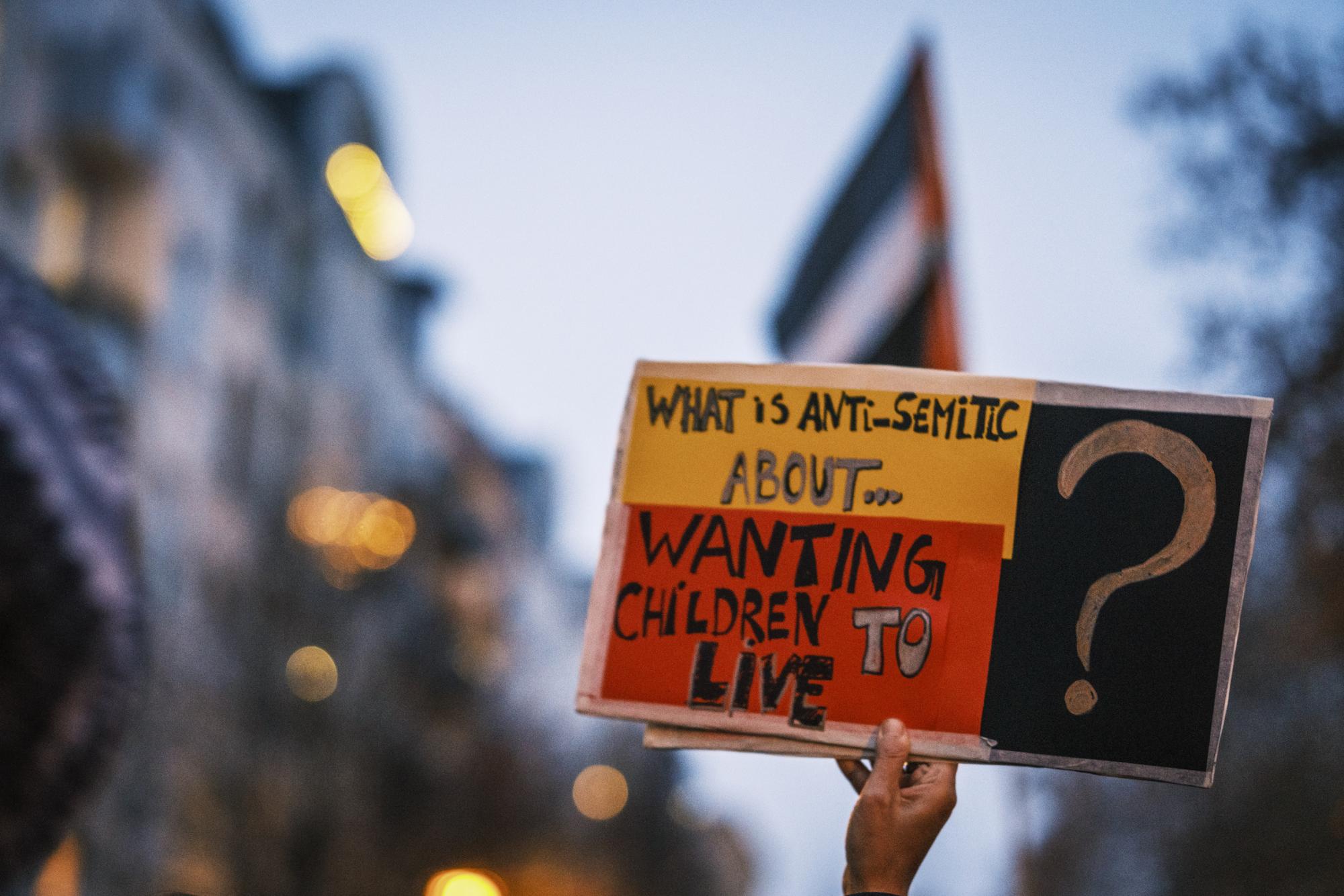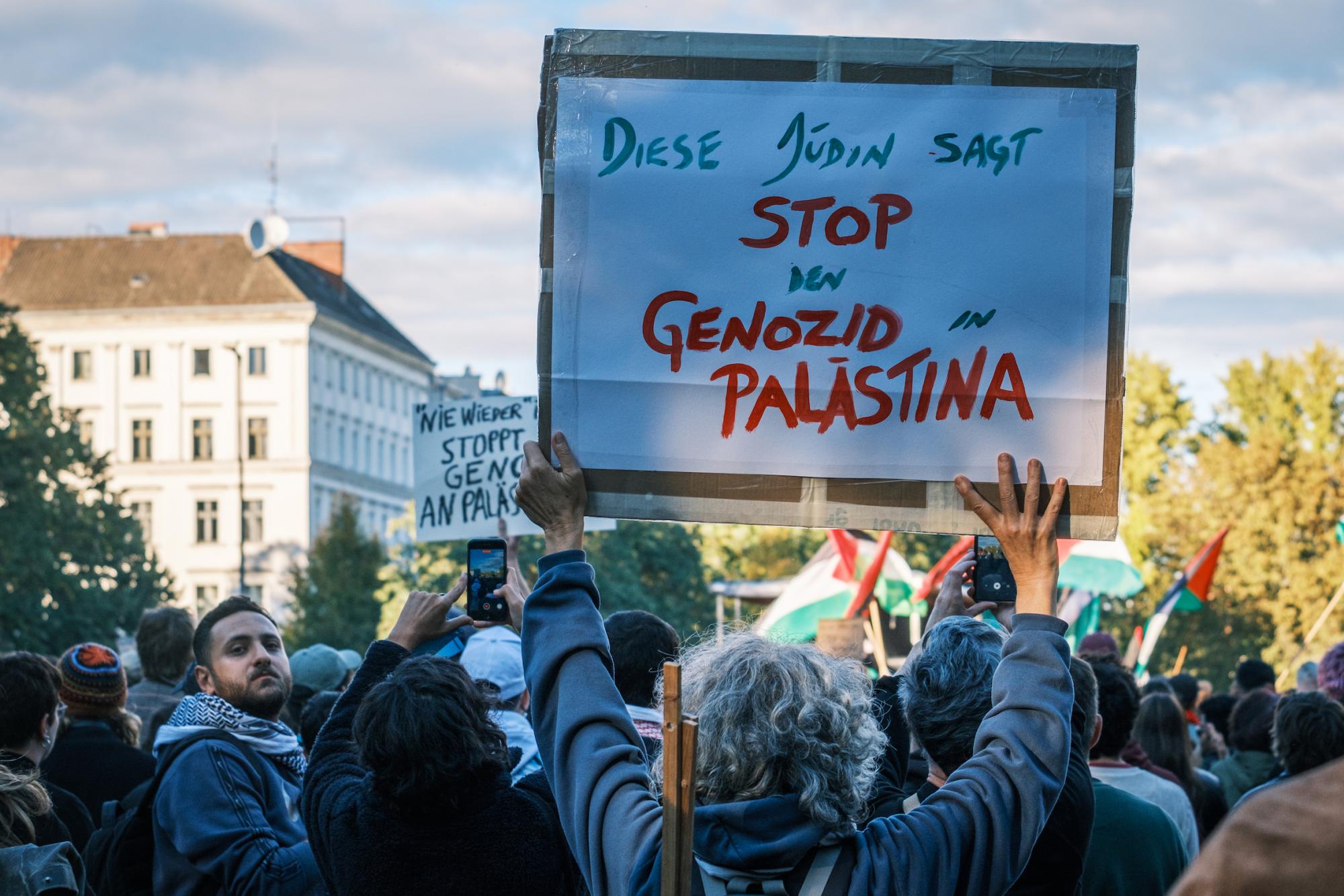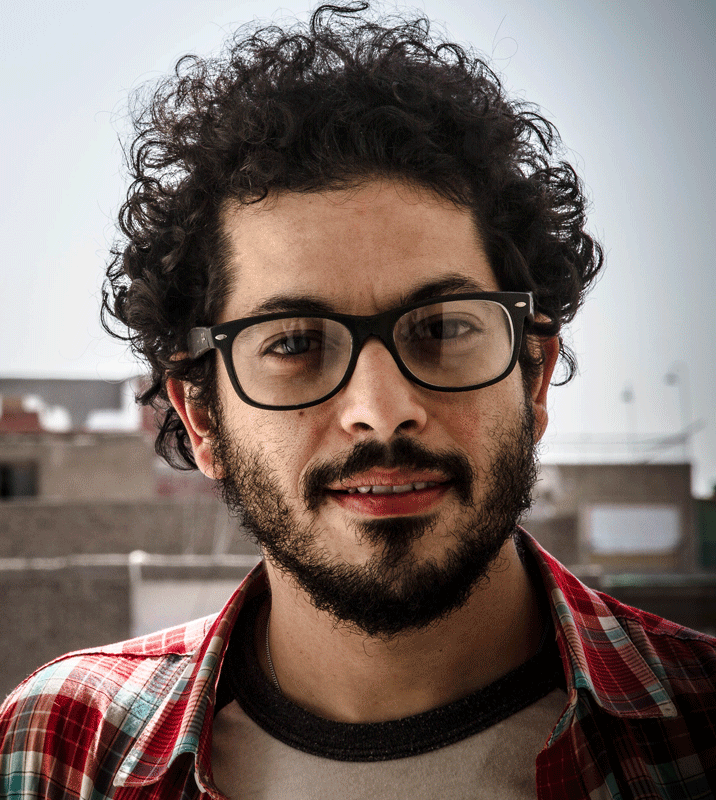Berlin attracted activists from WANA with the promise of freedom and rights. Our author now is reminded of his home country Egypt. A personal account of what it feels like to protest in Berlin these days.
The first protest against the genocide in Gaza I could attend in Berlin was late October 2023. Before, I had been away from Berlin, however, I had already seen videos of German police attacking and arresting minors. One of my friends found himself plowed down to the ground for no apparent reason, perhaps he had insisted that protesting was a right – something that the Berlin police no longer seemed to believe in.
As I made my way to Oranienplatz on that Saturday, October 21st, for the protest organized by Global South United, I prepared myself to no longer be able to rely on my basic rights and freedoms as a Berlin citizen. As we waited for a friend at a meeting point on the corner of Adalbertstraße and Oranienstraße, we saw a Spanish-speaking group preparing for the protest by writing the number of a lawyer for legal representation in case they were arrested on their arms, as some of the organizers had suggested. We asked to borrow their marker and did the same.
It was scary for me to join a protest in Berlin for the first time since October 7. This anxious feeling, however, was all too familiar. I had felt similar before joining some of the protests in Egypt in 2011. Yet once again I felt that it was imperative to join the protests. For me and many others, it was obvious: we did not need a ruling from the International Court of Justice (ICJ) to recognize that a textbook case of genocide was happening before our eyes.
From the river to the sea we demand equality
This protest on October 21st, after dark days of brutal repression, had large turnout, with many white faces possibly protecting the colored skins that showed up to protest. We found solace in one another, we were not so few, and we were not isolated. We sensed that many still had their humanity and were willing to take it to the streets and express their rejection of genocide and Germany’s staunch support of it while denying its mere possibility.
During that protest, the German police announced to ban the chant “From the river to the sea, Palestine will be free”. To me it seemed entirely incomprehensible, that an actual mass slaughter of innocent civilians is being tolerated and fueled by German weapons and that the mere chanting for freedom is deemed genocidal.
I suggested later after the protest that next time we use the chant “From the river to the sea, we demand equality” instead. With the changed slogan, we wanted to clarify our position it’s not a call for the killing of others, but a call for the liberation of Palestinians through equal rights. A demonstrator carrying a sign with the modified slogan was arrested when she joined a subsequent protest on November 4th, 2023. This absurdity was shocking to us first. By now, we have come to expect it from Germany’s institutions.
Our fears have no space
The flawed reporting and the abysmal standard of many editorial offices covering any topic related to Palestine is disappointing to me and many others. It always feels that many German media outlets will report in a constantly reductive manner: the protests are antisemitic and those who are protesting genocide are glorifying terrorism. No matter how scared a pro-Palestinian person is, their fears don’t make it to the general discourse. It is always reported that Jews are getting more afraid, even though a great many Jewish people with explicit signs came out with us saying they are against genocide, asking not to kill in their name.

Still, it appears that the media and the government would rather accuse a Jew of antisemitism than accept that their own support for the genocide has nothing to do with fighting antisemitism. It is well known that the Axel Springer group has a historical closeness to Israel, which has found its way into the publisher's statute. Bild, B.Z. and Welt in particular, which belong to Springer, did not report fairly on the protests, denigrating them as “Jew-haters”. From my perspective, it seems that there is always an angle that manipulates the German public, whose fear of sliding into antisemitism arguably contributes to not adequately combating antisemitism. For example, the fact that Springer often takes up and reinforces right-wing topics, especially with Bild, casts doubt on their supposed fight against antisemitism.
Universities are no longer spaces of open debates
The fact that many pro-Palestine or anti-genocide events are registered as antisemitic incidents also creates a distorted picture of the situation in Germany. According to the monitoring group RIAS, one fifth of the newly registered rise in antisemitic incidents are related to “anti-Israel activism”. However, 84 percent of antisemitic crimes are committed by the far right.
Our fears, our hurts, our opinions mean little – not only to the German media. There is no room for this at educational institutions either. In a meeting I attended with students in German universities protesting the atrocities in Palestine, the students’ stories were consistent across the board: German academia seems to be shutting down the conversation, even in places where knowledge and open debate are heralded through lip service. At the Free University in Berlin, police were allowed on campus to target the occupation of an Auditorium by pro-Palestinian students engaged in conversations around the sensitive matter. However, the accusations by Education Minister Bettina Stark-Watzinger (FDP) that the action at Freie Universität was “Hate against Israel” and “Hamas propaganda” seem even worse to me. She used a tweet by Bild reporter Iman Sefati as a basis for her allegations.
Fighting German Repression
Protesting in Germany reminds me of some of the less extreme days of authoritarian Egypt. It is shocking, but what I partly read in German Media, sounds like propaganda to me. I’ve learned to identify propaganda quickly from my days covering Egypt’s revolution. To me, the biggest propaganda message transmitted to the public is that free speech is protected in Germany even as the majority of pro-Palestinian voices are censored, silenced, and defamed, as the “Archive of Silence” is documenting on Instagram.

The systemic erasure of anti-genocide voices is what I’ve come to expect, and yet we carry on protesting. Those who start to see the genocide will not unsee it. As it continues, there is a mountain of evidence that German taxpayers’ money is being used to bury the evidence. As taxpayers, we are financing the erasure of our own voices.
Berlin has broken its promise of progressive values
I am disappointed. By the limited reaction from German society to the clamping down on freedoms. By the poor reporting on Palestine and the lack of journalistic standards in this regard. The support of Israel’s atrocities by Germany through arms sale, rhetoric, and institutional repression of protest. By the censorship of those speaking out against genocide in the cultural and academic sphere, which recently also affected the US anthropologist Nancy Fraser.
What hits me the me most is that I’m experiencing all of this not in Cairo or Moscow, but in Berlin. This city has betrayed its promise of freedom of expression and due process. A citiy that has enticed many from all over the world with the sweet bait of progressive values. Now, I feel trapped in a web of racism, bigotry, and defamation.
In Berlin, a battleground still exists
Protesting a genocide in Germany, particularly for darker-skinned people like me, means the potential loss of status and livelihood. Protesting is dealing with potential defamation, lies, and propaganda. Yet, here I am on a battleground that I do not have in Cairo, my other hometown.
I can still fight the dogmatic myths ingrained in German society that paint Palestinians as terrorists and Israel as infallible. I can fight the myth of equating anti-Zionism to antisemitism. I can fight the myth that basic rights like freedom of expression and a fair judiciary are guaranteed. I can fight the vilification of anti-genocide voices. I can fight to safeguard my morality, my sense of justice, and my soul.
After all, there is hope, and we have not yet been defeated. The countless student interventions, fighting off German academic censorship. The relentless protests in the face of brutal police forces and lying politicians. Independent media that portray a fairer picture of the situation in Germany as well akin Palestine. All of this gives me hope.
Right now, I feel that it is imperative that we continue to stand in the face of those who deny and support the genocide. We must fight to awaken our dormant allies who are living in an alternate reality but do not want to be complicit. We must fight to stop the killing of innocents. We must fight so that we can still look at ourselves in the mirror and perhaps tell our children one day: “We were not complicit in the genocide, we fought and fought until we ran out of breath. We fought and fought for our souls and yours.”



















